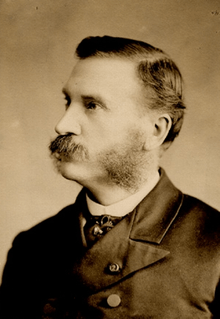Adolphe-Basile Routhier
Sir Adolphe-Basile Routhier FRSC (May 8, 1839 – June 27, 1920) was a Canadian judge, author, and lyricist. He wrote the lyrics of the original French version of the Canadian national anthem "O Canada". He was born in Saint-Placide, Quebec, to Charles Routhier and Angélique Lafleur.[1]
Sir Adolphe-Basile Routhier | |
|---|---|
 Routhier in c. 1890 | |
| Born | May 8, 1839 Saint-Benoît (Saint-Placide), Lower Canada |
| Died | June 27, 1920 (aged 81) Saint-Irénée-les-Bains, Quebec, Canada |
| Resting place | Cimetière Notre-Dame-de-Belmont |
| Nationality | Canadian |
| Occupation | lawyer, author, judge, and professor |
| Known for | Writing the lyrics of the original French version of the Canadian national anthem "O Canada" |
| Title | President of the Royal Society of Canada |
| Term | 1913–1914 |
| Predecessor | Frank Dawson Adams |
| Successor | Alfred Baker |
| Spouse(s) | Clorinde Mondelet ( m. 1862) |
Early life and education
Routhier was born and grew up in Saint-Placide, Quebec, on his family's farm. He attended Séminaire de Ste Thérèse, and later studied law at Université Laval.[2][3] He graduated and was called to the Quebec bar in 1861.
Career
Routhier practised law in Kamarouska until he was appointed to the Quebec Superior Court in 1873 (as Chief Justice from 1904 to 1906) and Admiralty of the Exchequer Court of Canada (from 1897 to 1906).[4][3]
Routhier was ran as a Conservative candidate for the riding of Kamarouska in several federal elections, but he was never elected.[4][5]
Routhier wrote a number of books under the name Jean Piquefort.[6] In 1880 he was commissioned to write the French lyrics for the Canadian anthem, "O Canada".[6]
In June 1914, Routhier was one of the three judges appointed to conduct the Commission of Inquiry into the sinking of the Canadian Pacific steamship Empress of Ireland, which had resulted in the loss of 1,012 lives.[7]
Personal
Routhier married Clorinde Mondelet on November 12, 1862, in Quebec and had one son.[4]
Honors
Many sites and landmarks were named to honour Basile Routhier. They include:
- Rue Basile-Routhier (Basile-Routhier Street), located in Shawinigan, Quebec, Canada;
- Place Basile-Routhier, located in Shawinigan;
- Rue Basile-Routhier in Montreal, Quebec;
- Boulevard Basile-Routhier in Repentigny, Quebec.
- Avenue Sir Adolphe Routhier in Quebec City, Quebec, Canada;
Selected publications
- Les Echos, P. G. Delisle, 1882.
References
- "Saint-Placide (Municipalité)" (in French). Commission de toponymie du Québec. Archived from the original on September 30, 2015. Retrieved March 11, 2009.
- John Robert Colombo (1978). The Poets of Canada. Hurtig Publishers. p. 52. ISBN 978-0-88830-150-5.
- Canada. Parliament. Special Joint Committee of the Senate and House of Commons on the National and Royal Anthems (1967). Minutes of Proceedings: June 8, 1967- Feb. 15, 1968. R. Duhamel. p. 2.
- Hébert, Yves (1998). "Routhier, Sir Adolphe-Basile". In Cook, Ramsay; Hamelin, Jean (eds.). Dictionary of Canadian Biography. XIV (1911–1920) (online ed.). University of Toronto Press. Retrieved January 27, 2015.
- Brian Thompson (2015). Anthems and Minstrel Shows: The Life and Times of Calixa Lavallée, 1842-1891. McGill-Queen's University Press. p. 218-219. ISBN 978-0-7735-4555-7.
- Kuitenbrouwer, Peter; Spires, Ashley (2015). Our Song: The Story of O Canada, the Canadian National Anthem. Scholastic Canada. p. 11. ISBN 978-1-4431-3372-2.
- Marshall, Logan (2014) [First published 1914]. The Tragic Story of the Empress of Ireland. New York, New York: Penguin Group US. p. 110. ISBN 978-0-698-15132-1. Retrieved January 27, 2015.
External links
- "Adolphe-Basile Routhier". Dictionary of Canadian Biography (online ed.). University of Toronto Press. 1979–2016.
- Works by or about Adolphe-Basile Routhier at Internet Archive